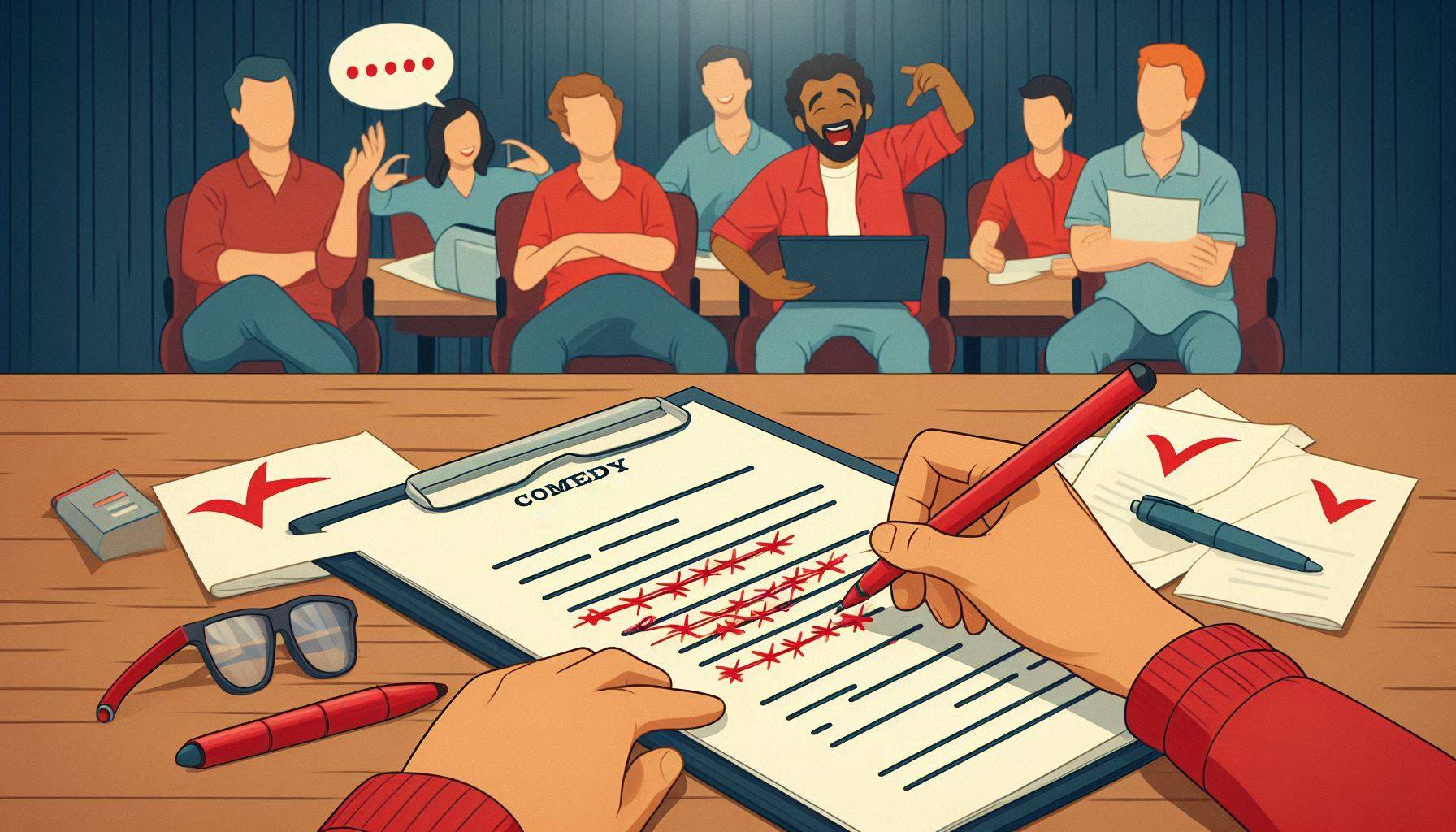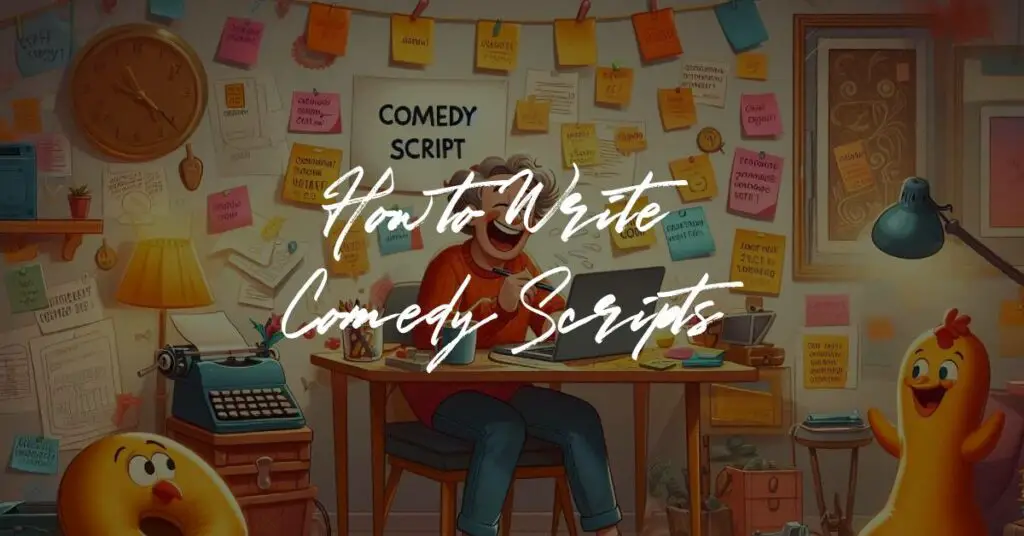Did you know that only about 5% of spec scripts ever make it to production? When it comes to comedy scripts, the competition is even fiercer. Yet, the allure of making people laugh through the written word continues to draw aspiring writers to this challenging but rewarding craft.
Whether you’re dreaming of writing the next “The Office” or crafting a hilarious stage play, this comprehensive guide will walk you through everything you need to know about writing comedy scripts that shine.
Understanding Comedy Writing Fundamentals
What Makes Something Funny?
At its core, humor is a psychological response to the unexpected. According to humor theorists, laughter often stems from the resolution of incongruity – when our brains recognize a pattern and then experience a surprising twist. This fundamental principle underlies most successful comedy writing.
Comedy comes in various forms:
- Situational comedy relies on putting characters in amusing predicaments
- Character-based comedy draws laughs from personality quirks and relationships
- Observational comedy finds humor in everyday life experiences
The most effective comedy scripts often blend multiple types while maintaining a consistent tone. The key is understanding that humor isn’t just about stringing together jokes – it’s about creating moments that resonate with your audience’s experiences and expectations.
Essential Elements of Comedy Scripts
Unlike dramatic scripts, comedy writing requires a delicate balance of story structure and humor. Your script needs:
- A solid narrative foundation that supports comedic moments
- Well-developed characters with clear motivations
- Precise timing and pacing to maximize laugh potential
- Meaningful conflicts that drive both story and humor
Remember, even the funniest jokes fall flat without a strong story framework supporting them.
Before You Start Writing
Research and Preparation
Success in comedy writing starts long before you type “FADE IN.” Begin by:
- Studying successful comedy scripts in your intended format. Pay attention to how professional writers structure their scenes, pace their jokes, and develop their characters. The scripts for shows like “30 Rock” or movies like “Bridesmaids” can teach valuable lessons about comedy writing techniques.

- Understanding your target audience is crucial. Different demographics respond to different types of humor. A joke that kills with Gen Z might bomb with Baby Boomers. Research your intended audience’s preferences, cultural touchstones, and comedic sensibilities.
- Finding your comedic voice takes time and practice. Start by identifying what makes you laugh and why. Your unique perspective on the world will inform your comedy writing style.
Developing Your Comedy Premise
A strong comedy premise acts as the foundation for your entire script. When developing your concept:
- Create a clear “what if” scenario that generates natural opportunities for humor
- Test your premise by pitching it to others and gauging their reaction
- Build a comedic world that supports your premise while remaining grounded enough for audiences to relate to
Writing Your Comedy Script
Character Development
Memorable comedic characters are the heart of any successful comedy script. Focus on:
Creating distinct personalities with clear flaws and quirks that can generate humor naturally. Think about characters like Michael Scott from “The Office” – his desperate need to be liked drives both comedy and story.
Developing character dynamics that create natural conflict and comedic tension. The best comedy often comes from relationships between characters with opposing traits or goals.
Writing distinctive voices for each character ensures they remain memorable and quotable. Each character should have their own way of speaking and viewing the world.
Using character flaws as comedy generators while ensuring they remain sympathetic and relatable. The key is finding the sweet spot between amusing and annoying.
Scene Structure
Comedy scenes require careful structuring to maximize their impact:
- Set up your comedic moments carefully, laying the groundwork for future payoffs
- Use callbacks to previous jokes to create layers of humor
- Manage tension and release to control the rhythm of your comedy
- Pace your scenes to build comedic momentum while giving audiences time to breathe
Dialogue Writing
Strong comedic dialogue balances natural speech patterns with humor:
Writing punchy one-liners requires precision and timing. Less is often more – trim your jokes to their essential elements.
Group dynamics in dialogue create opportunities for multiple characters to build on each other’s humor. Think about how friends banter in real life and recreate that natural flow.
Common dialogue pitfalls to avoid:
- Forcing jokes where they don’t belong
- Over-explaining the humor
- Breaking character for a laugh
- Using dated or offensive references
Advanced Comedy Writing Techniques
Types of Comedy Devices
Master these essential tools for creating humor:
Irony and misdirection work by setting up expectations and then subverting them in surprising ways. The key is making the surprise both unexpected and logical within your story’s context.
Running gags gain power through repetition and variation. Each time the gag returns, it should evolve slightly to keep it fresh.
Visual comedy can enhance your written jokes. Consider how physical humor, facial expressions, and environmental elements can support your dialogue.
Callbacks reference earlier moments in your script, creating satisfying payoffs for attentive audiences. Plant your setups carefully and make sure the payoffs feel earned.
Comedy Timing
Timing is crucial in comedy writing:
Page timing differs from screen timing. Generally, one page equals one minute of screen time, but comedy often requires additional space for physical bits and audience reaction.
Building comedic momentum means arranging your jokes to create rising action. Start with smaller laughs and build to bigger ones.
Using silence and beats gives your audience time to process jokes and creates contrast for your next laugh line.
Common Pitfalls and How to Avoid Them
Writing Mistakes
Watch out for these common errors:
Forcing jokes into your script rather than letting them arise naturally from character and situation. If a joke feels shoehorned in, it probably is.
Overwriting can kill comedy. Trust your audience’s intelligence and avoid over-explaining your jokes.
Breaking character for laughs undermines both your humor and your story. Stay true to your characters’ established personalities.
Development Issues
Maintain balance in your script:
Keep your comedy consistent with your plot. Humor should serve the story, not derail it.
Maintain a consistent tone throughout your script. While you can mix comedy styles, the overall feel should remain coherent.
Keep your stakes real and meaningful. Even in broad comedy, the characters need to care about the outcomes.
Polishing Your Comedy Script
Revision Process
Refining your comedy script requires multiple passes:
- Start with a structural edit focusing on story and character arcs
- Follow with a comedy pass to enhance and tighten jokes
- Get feedback from trusted readers who understand comedy
- Conduct table reads to hear how your dialogue sounds aloud

Testing Your Comedy
Evaluate your script’s effectiveness:
- Read scenes aloud to test dialogue flow and timing
- Workshop with other writers to get professional feedback
- Test your material with target audience members
- Record and analyze audience reactions during readings
Professional Tips and Industry Insights
From Working Comedy Writers
Successful comedy writers consistently emphasize:
- Writing every day to develop your voice
- Building a thick skin for rejection
- Finding writing partners or groups for support
- Staying current with comedy trends while developing your unique style
Breaking Into Comedy Writing
Build your career strategically:
Create a strong portfolio of comedy writing samples. Include different formats to showcase your versatility.
Network within the comedy community through:
- Writing groups and workshops
- Industry events and festivals
- Online communities and forums
- Social media connections
When seeking representation:
- Research agents who represent comedy writers
- Perfect your pitch
- Prepare multiple projects to show range
- Be professional and persistent
Resources and Tools
Recommended Reading
Essential books for comedy writers:
- “The Comic Toolbox” by John Vorhaus
- “Writing Movies for Fun and Profit” by Thomas Lennon and Robert Ben Garant
- “The Hidden Tools of Comedy” by Steve Kaplan
Communities and Networks
Connect with other comedy writers through:
- Writers Guild workshops
- Comedy festivals and conferences
- Online writing communities
- Local theater groups and improv classes
Moving Forward
Writing comedy scripts is a challenging but rewarding pursuit that combines technical skill with creative inspiration. Success requires dedication, practice, and a willingness to fail and learn from those failures. Remember that every successful comedy writer started exactly where you are now.
Start your comedy writing journey today by:
- Reading successful comedy scripts in your chosen format
- Developing your unique comedic voice through regular writing practice
- Building a network of fellow writers and comedy creators
- Creating a writing routine that works for you
Most importantly, keep writing, keep learning, and keep making people laugh. The world needs more humor, and your voice could be the one to provide it.
Ready to start writing your comedy script? Remember that every great comedy began with a single blank page and a writer brave enough to fill it. Your story starts now.
